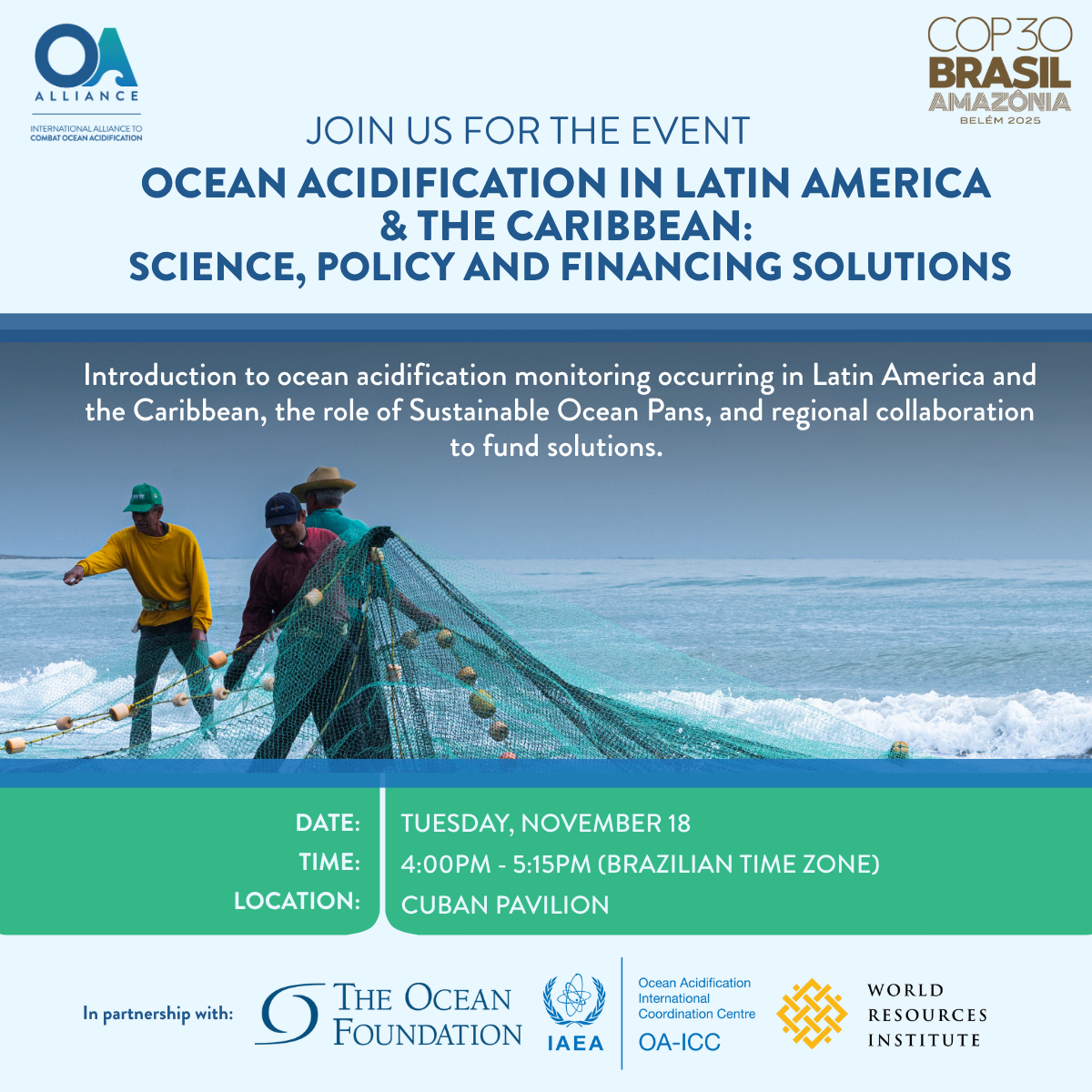OA Alliance at UNFCCC COP30
Paris Climate Agreement and the Ocean
It has been nearly ten years since the historic Paris Climate Agreement was adopted and agreed to by 195 countries. At the time, ocean and coastal issues were largely left out of the Agreement, leaving it to national governments and civil society leaders to advance much needed aspects of ocean science, mitigation, and adaptation across domestic and international policies.
In 2019, the UN Framework Convention on Climate Change (UNFCCC) created an official Ocean and Climate Change Dialogue to host critical discussions about how national governments can leverage elements of the Paris Climate Agreement to accelerate ocean-based mitigation efforts and combat climate-ocean changes.
Since 2020, countries have begun the work of incorporating ocean mitigation and adaptation aspects across their Nationally Determined Contributions (NDCs) and National Adaptation Plans (NAPs). More examples and increased climate financing are needed to support governments in this work. This year’s UNFCCC Meeting, COP30 is being held in Belem, Brazil and will focus on implementation of Parties NDCs/ NAPs and ongoing work to finance climate mitigation and adaptation projects. Three reports were issued by the UNFCCC last month, showing slow steady progress of Parties, but the pace must accelerate to keep goals of the Paris Climate Agreement in reach.
Calls to Action at COP30
Ocean acidification is a consequence of carbon emissions, and addressing it is central to global climate action, marine governance, and equity. Yet, it remains politically unaccounted for and many regions around the world still lack scientific, policy, and financing support in responding to acidification. That's why the OA Alliance is working to ensure that ocean acidification is centered in multilateral agendas like the Paris Climate Agreement.
Progress on ocean acidification at the UNFCCC must include:
🌎 A sustained focus on reduction of carbon emissions and keeping excess carbon out of our ocean. This includes supporting policies that transition the world to renewable sources of energy, decommissioning offshore oil and gas, decarbonizing transportation sectors including from shipping and exploring the role, safety and feasibility of different marine carbon dioxide removal strategies.
📜 Incorporation of ocean acidification science, mitigation and adaptation across NDCs/ NAPs (Guidance here).
📍Development of an ocean acidification indicator as part of the Global Goal on Adaptation.
💰 Adequate climate finance through the creation of a Blue Finance Window and other relevant mechanisms for ocean mitigation and coastal adaptation projects. These should include projects that protect seafood security and sovereignty in developing regions around the world.
JOIN US FOR OUR EVENTS
National, subnational and affiliate members of the OA Alliance will be active across COP30 events sharing examples and accelerating science, policy and adequate financing for responding to climate and ocean change.
Global Premiere of new short film
We are proud to share the global premiere of our short film“ “Changing Waters: Time for Action on Ocean Acidification.” Created by the OA Alliance and LUMA Storytelling, the film features OA Alliance members’ stories and experiences tackling ocean acidification and climate-ocean change in North America, Latin America, and the Pacific Island Region.
Filmed in Washington State, Colombia, and Fiji, this character-led short film follows real individuals from the government, indigenous communities, the seafood industry, and scientists who are responding to the accelerating impacts of ocean acidification and calling for action.
The piece aims to inspire broader awareness of this work and accelerate action at a critical moment for climate policy and financing.
Premiere dates and times:
IN- PERSON: Wednesday 19 November (the event was rescheduled due to severe weather conditions in Belem) between 5:00pm-5:50pm (Brazilian Time Zone) at the Blue Moana Pacific Pavilion, COP30 Belem Brazil.
VIRTUAL: Wednesday, November 19 between 12:00pm-1:30pm (Brazilian Time Zone) at the Virtual Ocean Pavilion. Register for the virtual premiere here.
Ocean Acidification in Latin America and the Caribbean: Science, Policy and Financing Solutions
Introduction to ocean acidification monitoring occurring in Latin America and the Caribbean, the role of Sustainable Ocean Pans, and regional collaboration to fund solutions.
Date: November 18, 2025
Time: 4:00pm - 5:15pm (Brazilian Time Zone)
Location: Cuban Pavilion at COP30, Belem Brazil
In partnership with: Ocean Foundation, Ocean Acidification International Coordination Center (OA-ICC), and World Resources Institute
Taking Science and Policy Action on Ocean Acidification
Come celebrate leadership in ocean acidification science and policy actions taken across countries. The event will emphasize the importance of addressing ocean acidification as part of the broader blue economy, including for seafood sovereignty and the sustainability of coastal livelihoods.
Date: Tuesday, November 18
Time: 12:15pm - 1:00pm (Brazilian Time Zone)
Location: Canadian Pavilion at COP30, Belem Brazil
In partnership with: Fisheries and Oceans Canada





